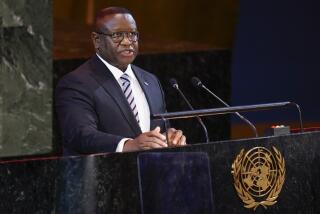S. African Council OKs 180-Day Detention Bill
- Share via
JOHANNESBURG, South Africa — The President’s Council today adopted a bill allowing detention without trial for 180 days, clearing the way for enactment despite opposition from Parliament’s Indian and mixed-race chambers.
The bill was approved on a 35-22 vote after an eight-hour debate by the council, which is controlled by supporters of the governing National Party and can adopt legislation stalemated in the three-chamber Parliament.
Under the bill, police could detain people without trial for 180 days, compared to the current 14 days.
The council was expected to follow the vote by adopting a second security bill that would give security forces broad powers in any district declared an “unrest area” by the minister of law and order.
President Pieter W. Botha referred the bills to the council Wednesday after the mixed-race and Indian chambers of Parliament rejected them a second time. The white chamber of Parliament passed the bills twice.
Botha must sign the bills for them to become law.
The government has said it was forced to declare a state of emergency June 12 partly because it could not get the security bills approved before Monday’s 10th anniversary of rioting in Soweto. Critics argue that the legislation would enable Botha to maintain a state of emergency under another guise.
Also today, the state Bureau for Information announced that a 4-year-old black girl and five other blacks were killed in unrest, raising the official death toll during the state of emergency to 54. Of those, 14 were killed by police, the government said in a statement.
The child was killed by gunfire from police who were firing at a fugitive in Soweto, the huge black township outside Johannesburg, the government said. Five other blacks were killed in a 24-hour period that ended early today, the statement said, including four who died in a shoot-out between black policemen and a group near Durban.
The bureau, virtually the sole source of official information, today imposed new restrictions on daily media briefings, which have been marked by angry questions from reporters, queries about reports of clashes with police and general complaints.
The bureau said officials will now answer questions only about the police report of fatalities.
More to Read
Sign up for Essential California
The most important California stories and recommendations in your inbox every morning.
You may occasionally receive promotional content from the Los Angeles Times.










